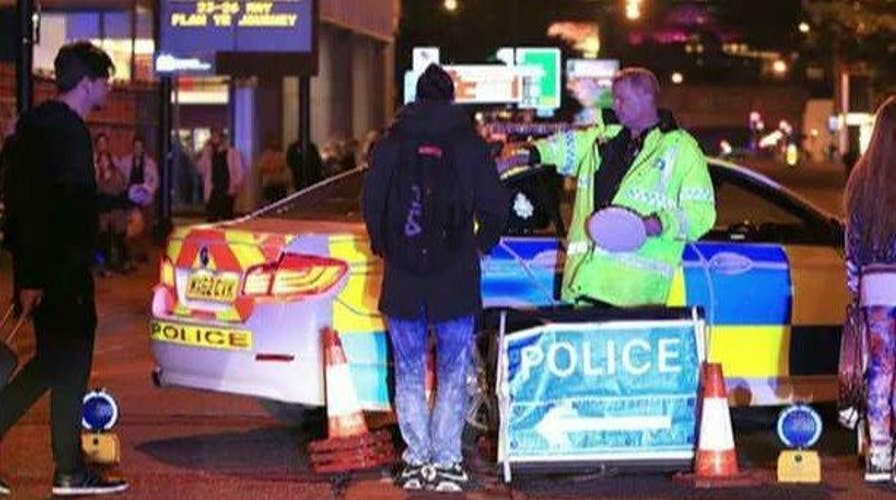US official: Reports of shrapnel suggest premeditation
Chief intelligence correspondent Catherine Herridge reports on deadly blast at Ariana Grande concert in Manchester, England
Mission accomplished. There was absolute panic, screaming, running, chaos and fear. The explosion itself and word of a bomb sent thousands of the 20,000 people attending the Ariana Grande concert in Manchester, rushing towards the exits and the ticket area where the suicide bomber detonated a shrapnel-filled weapon soon after Grande had finished her performance.
Parents waiting for their children just outside the arena were equally panicked as they raced inside or watched, waited, and prayed that their children would be among those running down the arena’s stairs to safety.
The vast arena in Manchester, Britain’s second largest metropolitan area, was the ultimate soft target. But the still unknown bomber struck just outside the stadium, possibly because he was unable to enter the arena, a tribute to the effectiveness of British security measures already in place.
Had the bomber been able to enter the stadium, the death toll would have been far higher than the 22 victims so far, and the 59 injured. The bomber had chosen his target well. Those attending and fleeing the carnage were Grande’s most devoted fans -- disproportionately teenage and pre-teen girls.
Much about the attack is still unknown – the identity of the bomber, the exact composition of the bomb, where it was made, whether there were other targets, and whether the bomber acted alone – the proverbial “lone wolf” terrorist – or was part of a larger cell, and therefore, part of a broader conspiracy with a support system and possibly other targets. Was this an inspired or directed attack?
No matter how many ultimately die, the terror among those attending the concert that night, or the parents waiting outside to see their children or for their cell phones to ring, will never forget this terrible night.
And that, precisely, was the terrorist's goal: to spread fear and terror, in this case, by striking at children.
By 3am in Manchester, no one had yet claimed responsibility for the attack.
British police, who have been battling terrorism since the Irish Republican Army’s attacks in the early 1970’s, are second to none in this type of grueling work. UK police and intelligence have thwarted literally dozens of planned attacks on Britain.
Police have been analyzing the residue of the bomb, trying to match it to recipes that have been posted in Al Qaeda’s Inspire and other on–line jihadi magazines.
Other teams are monitoring social media, searching for clues to the bomber’s identity and/or his supporters, many of whom were soon praising the vicious attack on line.
Still other investigators are tracking video footage from thousands of the 4-5.9 million CCTV surveillance cameras installed in public places in the U.K.
Still other detectives and intelligence analysts will be asking why the bomber struck on Monday night.
Sebastian Gorka, an adviser to the Trump administration, notes that Monday night’s attack occurred on the 4th anniversary of the machete murder of Fusilier Lee Rigby by a self-professed jihadi. “Dates matter to Jihadi terrorists,” Gorka tweeted.
Or, is the attack linked to President Donald Trump’s declaration of war against radical Islamist terror in Riyadh on Sunday?
Is it the Islamic State’s effort to mock the joint Sunni-Arab American joint pledge to join voices to defeat them?
In Manchester and London and throughout other cities in London, police and British intelligence will be checking on 900 U.K. citizens of Muslim origin who have gone to the fight in the “jihad” in Afghanistan, Iraq, and Syria, hundreds of whom have returned to Britain. Though large, there are fewer Jihadi returnees in Britain than in France, Germany, and other European countries. But the U.K. has ten times the number of suspected Jihadi sympathizers as the U.S..
The FBI’s large office in London will also be mobilized. Are there new threats of comparable lethality in America? And here in New York, the 1,000 members of the NYPD’s counter-terrorism division will be mobilized. Extra police will be deployed on Tuesday to public venues, transportation hubs, and other potential American targets.
Radical Islam may be losing ground in Syria and Iraq, but the fight against it in the cities of Europe and America is far from over.

